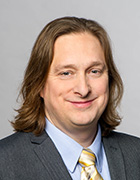
Time & Date:
19.10.2017
5-7 ct
Room 47.0.501 (Teaching block WWP)
Universität West
Albert-Einstein-Allee 47
89069 Ulm
Local Host:
Prof. Dr. Dr. Daniel A. Braun
Links:
Cognitive Systems and Human-Computer Interaction
Cognitive Systems M.Sc.
Abstract: The human sensorimotor control system has exceptional abilities to perform skilful action despite ever changing conditions. I will discuss how this adaptability can result through intrinsic feedback mechanisms in two different ways: sensory feedback driving feedforward adaptation; and feedforward adaptation in turn adapting the feedback responses and tuning them to the environment. In the first part of my talk I will examine how prior sensorimotor cues can be used to learn independent motor memories. These results suggests that motor memories are encoded not simply as a mapping from current state to motor command but are encoded in terms of the recent history of sensorimotor states. However learning can also be used to adjust intrinsic feedback control. The second half of my talk will focus on a few recent studies examining feedback responses; demonstrating both how they are modulated for control and using them to probe the underlying mechanisms of visually guided reaching.
Bio. Prof. David Franklin investigates the physiological and computational principles of human neuromuscular motor control. His research examines how the nervous system controls the mechanical properties of the body to adapt to our external environment and produce skilful movement. To examine the computations underlying sensorimotor control, he blends computational and experimental approaches including robotics and virtual reality.
Prof. Franklin studied human physiology and was awarded a doctorate in neuroscience in 2005 from the Department of Kinesiology at Simon Fraser University (Canada). He worked as a researcher at the Institute for Advanced Telecommunications Research (Kyoto, Japan) from 1999 to 2006. He then spent 3 years as a research associate in the Department of Engineering at the University of Cambridge (U.K.). In 2010 he was awarded a Wellcome Trust RCD Fellowship and became a research fellow at the University of Cambridge. He has been an associate professor of Neuromuscular Diagnostics at TUM since 2016.

Time & Date:
19.10.2017
5-7 ct
Room 47.0.501 (Teaching block WWP)
Universität West
Albert-Einstein-Allee 47
89069 Ulm
Local Host:
Prof. Dr. Dr. Daniel A. Braun
Links:
Cognitive Systems and Human-Computer Interaction
Cognitive Systems M.Sc.